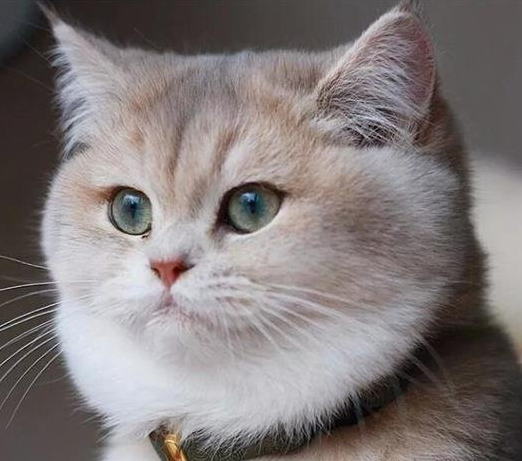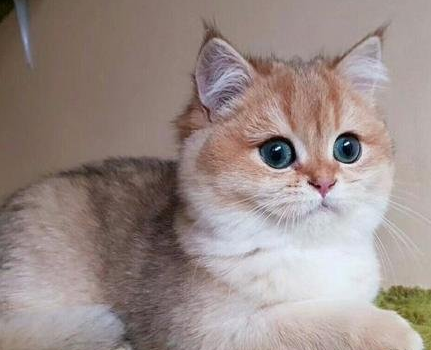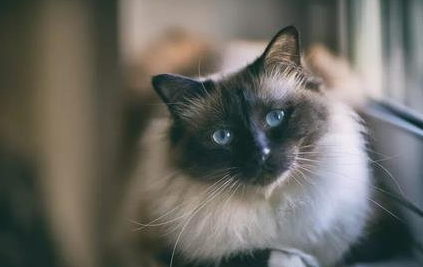
What happens to cats eat oranges?
05/29/2024
How Much Water Does an Adult Cat Need to Drink?
06/03/2024What You Need to Know About Homemade Cat Food
Pet parents may consider cooking at home for their pet for many different reasons. This may include concerns related to pet food recalls, health conditions such as food allergies, and/or the desire to provide the best quality food for your fur baby. The internet is full of recipes and advice on the best way to cook for cats, so you might be surprised to learn that veterinarians and veterinary nutritionists advise against this practice. Cats’ dietary requirements and the way they absorb nutrients are extremely complex. It is very difficult to develop a diet at home that meets all their nutritional needs and allows these nutrients to be absorbed correctly. If not handled properly, the cat’s health can be at serious risk. Learn about your cat’s unique dietary needs and alternatives to home cooking.
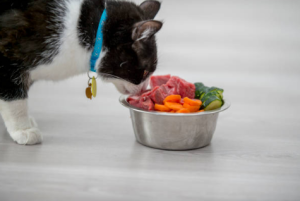
Common Reasons for Wanting to Cook for Cats
Pet food recall
Over the years, pet food has been recalled for a number of reasons. Most of the time, companies voluntarily recall a batch of food products if there is a minor problem. For more serious risks, the FDA may issue a mandatory recall if there are concerns about serious adverse health consequences or death. When these stories make the news, pet parents are naturally anxious. At the same time, these recalls let us know that our cats’ commercial diets are carefully monitored and tested so that we can quickly identify these issues and take action. Feeding a homemade diet may give you more control, however, homemade diets also carry the risk of contamination with potentially dangerous bacteria and/or unsafe ingredients.
Medical conditions
If your kitten has been diagnosed with certain health conditions, it may need to change its diet. While it may feel overwhelming at first, dietary changes can go a long way in managing certain diseases. For example, a special diet is often recommended for cats with diabetes, kidney disease, food allergies, or urinary tract disorders. Prescription diets are carefully formulated to help treat these medical conditions in ways that over-the-counter commercial diets can’t provide. They should only be used to diagnose cats with that particular condition and should only be used under the guidance of a veterinarian.
Want the highest quality ingredients
When you see the ingredients listed in commercial pet food, they may sound unappealing or, frankly, disgusting. You’ll be surprised when you read the label and see a “chicken by-product” or something equally unappetizing, imagining that it might be more appealing for your kitten to eat a delicious piece of grilled chicken and shrimp. However, what you don’t see is the actual nutritional value of these ingredients. In most cases, the ingredient list doesn’t tell the whole story, as pet food companies can add certain ingredients to improve their image without real nutritional value. In other cases, the best nutrients may come from ingredients that don’t sound appealing but contain more of what your cat needs.
Picky kittens
Most cat owners have been here at one time or another. You open a can of your kitten’s favorite food like you do every day, and suddenly, it sniffs and walks away in complete disgust. This could be a sign that your cat is sick, so you should always check with your veterinarian when this happens. Sometimes, it could be a change in the cat’s preferences or a behavioral problem. It can be especially frustrating if your healthy cat turns its nose up at the hodgepodge you offer while stealing table scraps. It can cause cat owners to think that their cats want human food and that home-cooked diets can soothe them. However, it is important to consider other factors, such as boredom, fear, or changes in diet formulas, to understand why your cat is no longer eating food. If deeper problems arise, they will reappear, even with a homemade diet.
Expenses
Let’s face it, high-quality commercial cat food can be expensive. Cooking for your cat at home seems to be a way to save money and provide quality ingredients. However, to do this correctly and provide your cat with all the necessary nutrients, the cost will be much higher than most commercial diets on the market. This is because you need to cook a fresh batch of food every few days to avoid spoilage, and you need to buy many different ingredients and supplements to provide your cat with a balanced diet.
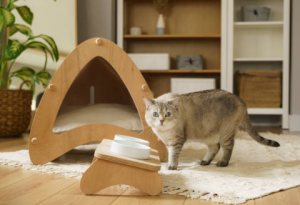
Cats’ Unique Nutritional Needs
Cats have special dietary needs that are different from humans and dogs. This makes home cooking particularly challenging for them. Cats are true carnivores, which means they need a high content of animal protein as a major part of their diet. In addition, they are unable to make certain amino acids and vitamins, which must be absorbed from the diet. Wild relatives of cats and outdoor cats usually get these nutrients when they eat their whole prey. Commercial diets are also carefully formulated to meet these needs. However, it is very difficult to meet these needs by cooking for cats, as many nutrients come from internal organs, bones, and other parts of prey that are not usually cooked in our homes. As a result, home-cooked diets often lack important nutrients unless balanced with plenty of supplements.
Risks of Homemade Eating
If you find yourself in one of the above situations, then you might understandably consider cooking at home for your cat. However, as you learn more about your cat’s highly specific dietary needs, the challenges and health risks become more apparent. In fact, a 2019 study showed that more than 100 home cooking recipes for cats that have been tested and analyzed are all lacking in important nutrients and are not as complete as commercial diets. Citations The most frequently asked questions include:
Nutritional deficiencies
Deficiencies in a homemade diet include taurine, choline, iron, thiamine, and vitamin E. Cats that are not consuming enough of these nutrients may look fine temporarily, which can reassure owners that their diet is adequate. However, when they do show signs of defects, the situation can be serious.
Taurine deficiency can lead to heart disease (dilated cardiomyopathy), retinal degeneration leading to blindness, and neurological symptoms.
Iron deficiency may lead to anemia, leading to weakness, lethargy, shortness of breath, and the risk of collapse or death in cats.
Thiamine deficiency may initially cause decreased appetite, nausea, and vomiting. Over time, it can cause severe neurological symptoms, including tripping, blindness, inability to lift your head, seizures, coma, and even death.
Choline deficiency often leads to liver problems. In cats, this can trigger hepatic lipid or fatty liver disease, which can be serious and difficult to treat.
Vitamin E deficiency in cats can lead to panstatomitis, a condition in which body fat becomes inflamed and painful.
Foodborne illness
In addition to concerns about an unbalanced diet, home cooking can increase the risk of foodborne illness and/or spoilage. This is because homemade foods have a much shorter shelf life and lack preservatives that can prolong their stability. New batches of food need to be cooked every few days to avoid illnesses associated with the growth of bacteria and other harmful bacteria. For the same reason, leaving homemade food in your cat’s bowl at room temperature also increases the risk of harmful bacteria, making it difficult to keep the food for a long time. A raw food diet further magnifies these risks, as feeding raw meat skips the step of thoroughly heating the food to kill bacteria. Raw food is at a much higher risk of contamination with harmful bacteria such as Salmonella and E. coli, and humans also get sick from handling raw pet food.
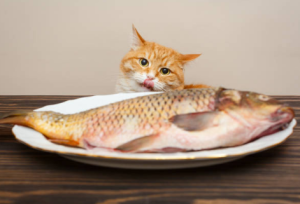
The taste is not appealing
Home-cooked meals are usually not very tasty for cats. This is because in order for them to be nutritionally complete, many supplements need to be added to the basic ingredients, and most cats lose interest due to their taste and/or smell.
A Safer Alternative to Home Cooking Recipes
The best option for a healthy diet is to find a commercial food or cat food delivery service that meets your cat’s needs. With so many cat food options available now, it’s possible to find something to suit even the most discerning tastes or the most specific needs. When analyzing a diet to determine if it is nutritionally complete, it is important to look at a number of factors beyond the ingredient list. The World Small Animal Veterinary Association has put together a list of important guidelines, and the Pet Nutrition Alliance has produced an interactive document where you can see if a particular pet food manufacturer is meeting these guidelines.
For those kittens who require a special diet due to health issues, the best option is to consult with your veterinarian to find a prescription diet that will meet your cat’s health needs. If these diets are not suitable for some reason, it is important to consult with your veterinarian to find a safe alternative. Sometimes they know of other creative solutions that can meet your cat’s nutritional and medical needs.
Finally, for the very rare case where there is no commercial diet available to meet your cat’s needs, you will need to consult with a board-certified veterinary dietitian to obtain a custom-designed diet for your cat. A dietitian will be able to develop a diet that includes all the nutrients that cats need. They usually use specialized software to calculate the exact amount of all the important supplements. To keep up with this eating habit, be prepared to put in a lot of labor and expense, and make sure to follow the instructions closely. Even changing the brand or source of a nutrient can affect the cat’s absorption of it.
There are many reasons why cat owners consider cooking at home, however, complications from homemade diets can be serious and simply not worth the risk. Cats are complex small animals with unique dietary requirements, and ensuring that their diet is healthy and balanced is best left to the experts.

